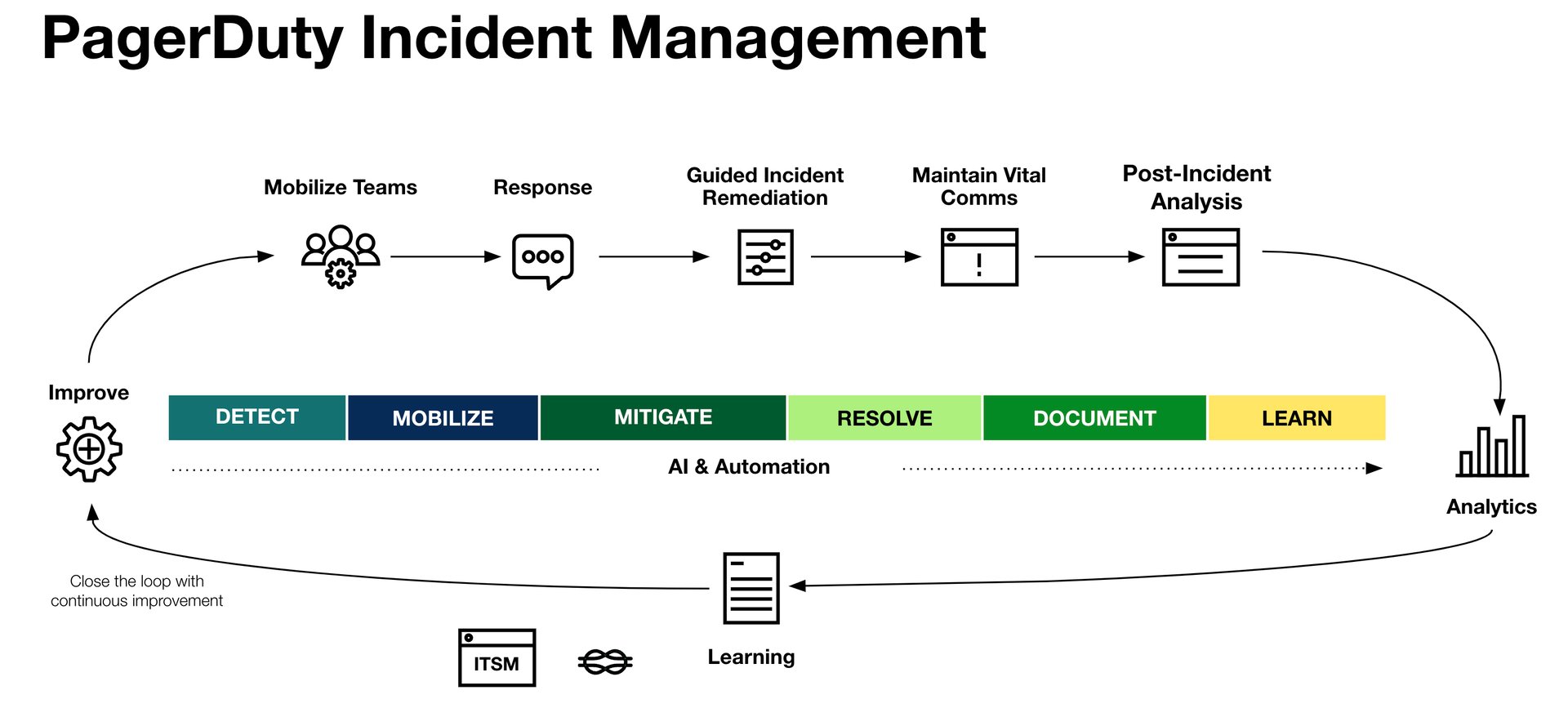- PagerDuty /
- Blog /
- Incident Management & Response /
- Build More Resilient Operations with PagerDuty Incident Management
Blog
Build More Resilient Operations with PagerDuty Incident Management
Mitigating business risk is a key enterprise priority. To avoid unnecessary exposure to the business, technical teams need a proactive approach to managing incidents. While this is a well-known challenge, it’s also much easier said than done. Over the years, many organizations have cobbled together their own bespoke processes for managing different types of incidents. The patchwork approach of tools and processes has made the whole endeavor unwieldy and unscalable, leading to delays in resolving incidents and negative impact to customer satisfaction.
Clearly, there are still gaps in accountability and coordination before, during and after incidents. To address these gaps, technical teams often rely on a mix of do-it-yourself and third-party tools, integrating into legacy systems for quick fixes. However, once the band-aid fix is implemented, the continuous influx of incidents leaves little time for reflection and improvement. Without dedicated time for documentation and learning, these incidents persist, hindering progress, leading to team burnout, and ultimately, delaying the development of revenue-driving features that customers are looking for.
The modern enterprise needs to transform its approach to managing incidents. By shifting the focus towards scalable processes, dynamic guidance and continuous improvement, organizations can drive accountability and help build resilience over time.
Introducing a new end-to-end incident management solution
Today, we’re excited to launch the Enterprise plan for Incident Management. As part of the PagerDuty Operations Cloud, this new product provides our customers with a unified platform that manages incidents from start to finish.
This new offering continues to deliver on the promises of the PagerDuty Operations Cloud to solve the biggest problems facing the modern digital enterprise. Today, customers are dealing with more complex digital ecosystems than ever. PagerDuty is making the incident lifecycle more resilient by offering flexibility and efficient solutions to resolve incidents. Our Incident Management solution for the enterprise streamlines alerting processes, automates remediation and triages, AI-powered insights from past incidents and correlated events, and post-incident reviews. Bringing together the best of PagerDuty’s Incident Management innovations with the new combined capabilities from our Jeli acquisition, customers have a single end-to-end offering. Specifically, Incident Workflows, Status Pages, and the offerings from our acquisition of Jeli, a Slack-first coordination and post-incident reviews today, are combined in Incident Management for enterprises.
By driving visible continuous improvement and offering remediation guidance at every stage of the incident lifecycle, PagerDuty eliminates the guesswork in managing incidents. Our proactive approach minimizes downtime and empowers businesses to redirect their efforts toward innovation. With PagerDuty Incident Management, companies can confidently navigate incidents knowing they’re on the path to sustained progress and success.
Here are three ways that PagerDuty helps transform major and minor incident management.
Mitigate revenue and reputational risks
![]()
PagerDuty Incident Management is the only platform that seamlessly integrates automation, communication, and resolution. New advanced actions added to Incident Workflows ensure timely status updates for important stakeholders and customers, promote SLA adherence, and help build reputational trust. Through our newest feature Jeli Post-Incident Reviews, organizations can easily analyze what went wrong and how to prevent incidents from happening in the future, fostering a more proactive approach to incident management.
Streamline processes for faster resolution
![]() Even all-level team members can effectively manage major incidents with PagerDuty Incident Management, which automatically assigns roles and tasks, promoting accountability and best practices. Teams can collaborate and communicate via Slack or Microsoft Teams, while PagerDuty unifies third-party information through automated updates, ensuring prompt response and resolution.
Even all-level team members can effectively manage major incidents with PagerDuty Incident Management, which automatically assigns roles and tasks, promoting accountability and best practices. Teams can collaborate and communicate via Slack or Microsoft Teams, while PagerDuty unifies third-party information through automated updates, ensuring prompt response and resolution.
Consolidate, simplify, and save
![]()
By integrating on-call capabilities, automated remediation guidance, and post-incident reviews and analysis into a united platform, PagerDuty eliminates complexity and reduces tech debt associated with overlapping tools. This consolidation transforms workflows, providing teams with a centralized hub for all necessary information and eliminating the inefficiency of switching between systems. This streamlined approach saves time, enhances collaboration, and reduces operating costs.
Make the move to PagerDuty Incident Management
Don’t let unscalable processes and tools hinder your organization’s ability to navigate IT complexity, minimize risk, and foster innovation. For customers whose organizations deploy the solution across teams to keep customer service teams in the loop with their technical counterparts, there is also an enterprise-edition of Customer Service Operations now available.
Take the next step in modernizing your operations with PagerDuty Incident Management today.
Want to learn more? Watch our latest webinar, Prepare for the Unexpected: How Continuous Improvement in Incident Management Reduces Risk and Improves Quality of Life, for more information.
Experience the PagerDuty Incident Management firsthand with our free trial.



